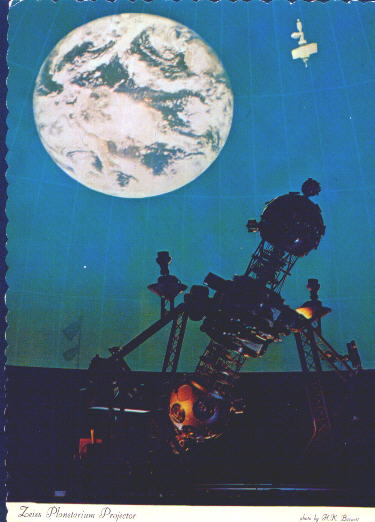
During a 1504 Total Lunar Eclipse, the natives of Jamaica cower in
fear, as Christopher Columbus warns that his God is displeased with
them. (Image Source: Wikipedia.org )
By Glenn A. Walsh
Reporting for SpaceWatchtower
As we commemorate the day Christopher Columbus arrived in the Americas, we note how he saved his crew from starvation using astronomical information from an almanac.
Today (October 12) is the day known as Columbus Day, when we commemorate the 1492 arrival of Christopher Columbus' three-ship fleet in the Americas, which he thought was the Far East. As October 12 falls on a Sunday this year (2014), the official United States Federal Government observance of Columbus Day occurs tomorrow (October 13). In Canada, October 13 is also recognized as Thanksgiving Day, earlier than the American Thanksgiving Day (Fourth Thursday in November) due to the earlier harvest of the far northern latitudes.
Since the time man first set sail on the seas, navigation by the stars was a necessity. When Christopher Columbus set sail to find an ocean route to the Far East, by sailing west, he took with him an almanac authored by Abraham Zacuto, which included astronomical tables originally calculated by the German astronomer Regiomontanus (whose real name was Johannes Muller von Konigsberg).
During Columbus' fourth and last voyage to the Americas, he lost all four ships due to an epidemic of shipworms eating holes in the wooden ships. He was forced to beach the last two caravels on the northern coast of Jamaica on 1503 June 25. At first, the natives on Jamaica welcomed Columbus and his crew and provided them with food and other necessities, in return for items the crew could salvage from the ships.
After being marooned on Jamaica for about six months, half of Columbus' crew mutinied as well as robbing and murdering some of the natives. As the natives had also grown weary of supplying the unexpected castaways, Columbus and his crew faced famine.
Columbus came-up with an ingenious plan to save his crew. In Zacuto's almanac, Columbus noticed that a Total Eclipse of the Moon would occur on the evening of 1504 February 29 to March 1. Three days before the eclipse, Columbus met with the tribal Chief of the natives, telling him that the Christian God was angry with the Jamaican people for stopping the supply of food to Columbus and his men. Columbus told him that God would display his displeasure by all-but obliterating the rising Full Moon in three days. This Moon would be "inflamed with wrath" as an omen for what was to come for the Jamaican people.
On the predicted day and hour, the natives watched as the Moon rose with the lower edge missing. As the sky grew darker, they saw the Moon take-on a bloody-red appearance.
Ferdinand, Christopher Columbus' son, later wrote:
"The Indians observed this [the eclipse] and were so astonished and frightened that with great cries and lamentations they came running from all directions to the ships, carrying provisions and begging (...) and promising they would diligently supply all their needs in the future."
The natives begged Columbus to have his God restore the Moon. Columbus went to his cabin to "confer" with his God. He actually watched his hour-glass for the time the total phase of the eclipse would end. Just before the end of totality, Columbus reemerged from his cabin to announce to the natives that his God had pardoned them, and the Moon would slowly be restored to normal later in the night.
The Jamaican natives kept their word, and Columbus and his crew were well-supplied until a rescue ship from Hispaniola (today, the island that includes the Dominican Republic and Haiti) arrived on 1504 June 29. Columbus and his crew returned to Spain on 1504 November 7.
An interesting anecdote: When Mark Twain wrote his 1889 novel, A Connecticut Yankee in King Arthur's Court, he was inspired by Columbus' ploy to have his main character, Hank Morgan who had inadvertently time-traveled to the era of King Arthur and Merlin the Magician, saved from execution by predicting a solar eclipse, and, thus, claiming power over the Sun. However, Mark Twain never checked any almanacs while writing the novel, and no eclipse actually occurred on the date he used in the novel: A.D. 528 June 21.
Total Lunar Eclipse of 1504 February 29 to March 1 ---
NASA - Astronomical Details:
Link >>> http://eclipse.gsfc.nasa.gov/LEhistory/LEplot/LE1504Mar01T.pdf
More Information:
Space.com / Joe Rao - Link 1 >>> http://www.space.com/2729-lunar-eclipse-saved-columbus.html
Wikipedia - Link 2 >>> http://en.wikipedia.org/wiki/March_1504_lunar_eclipse
More on Lunar Eclipses: >>> http://en.wikipedia.org/wiki/Lunar_eclipse
Related Blog Posts ---
Colorful, Early Wed. Morning Lunar Eclipse w/ Web-Casts (2014 Oct. 8):
Link >>> http://spacewatchtower.blogspot.com/2014/10/colorful-early-wed-morning-lunar-eclipse.html
U.S. to See 4 Total Lunar Eclipses in Year & A-Half (2014 March 29):
Link >>> http://spacewatchtower.blogspot.com/2014/03/us-to-see-4-total-lunar-eclipses-in.html
Source: Glenn A. Walsh, Reporting for SpaceWatchtower, a project of Friends of the Zeiss.
2014: 75th Year of Pittsburgh's Buhl Planetarium

Want to receive SpaceWatchtower blog posts in your inbox ?
Send request to < spacewatchtower@planetarium.cc >..
gaw
Glenn A. Walsh, Project Director,
Friends of the Zeiss < http://buhlplanetarium.tripod.com/fotz/ >
Electronic Mail - < gawalsh@planetarium.cc >
SpaceWatchtower Blog: < http://spacewatchtower.blogspot.com/ >
Also see: South Hills Backyard Astronomers Blog: < http://shbastronomers.blogspot.com/ >
Barnestormin: Writing, Essays, Pgh. News, & More: < http://www.barnestormin.blogspot.com/ >
About the SpaceWatchtower Editor / Author: < http://buhlplanetarium2.tripod.com/weblog/spacewatchtower/gaw/ >
SPACE & SCIENCE NEWS, ASTRONOMICAL CALENDAR:
< http://buhlplanetarium.tripod.
Twitter: < https://twitter.com/spacewatchtower >
Facebook: < http://www.facebook.com/pages/
Author of History Web Sites on the Internet --
* Buhl Planetarium, Pittsburgh:
< http://www.planetarium.
* Adler Planetarium, Chicago:
< http://adlerplanetarium.
* Astronomer, Educator, Optician John A. Brashear:
< http://johnbrashear.tripod.com >
* Andrew Carnegie & Carnegie Libraries:
< http://www.andrewcarnegie.
* Civil War Museum of Andrew Carnegie Free Library:
< http://garespypost.tripod.com >
* Duquesne Incline cable-car railway, Pittsburgh:
< http://inclinedplane.tripod.
* Public Transit:
< http://andrewcarnegie2.tripod.
No comments:
Post a Comment